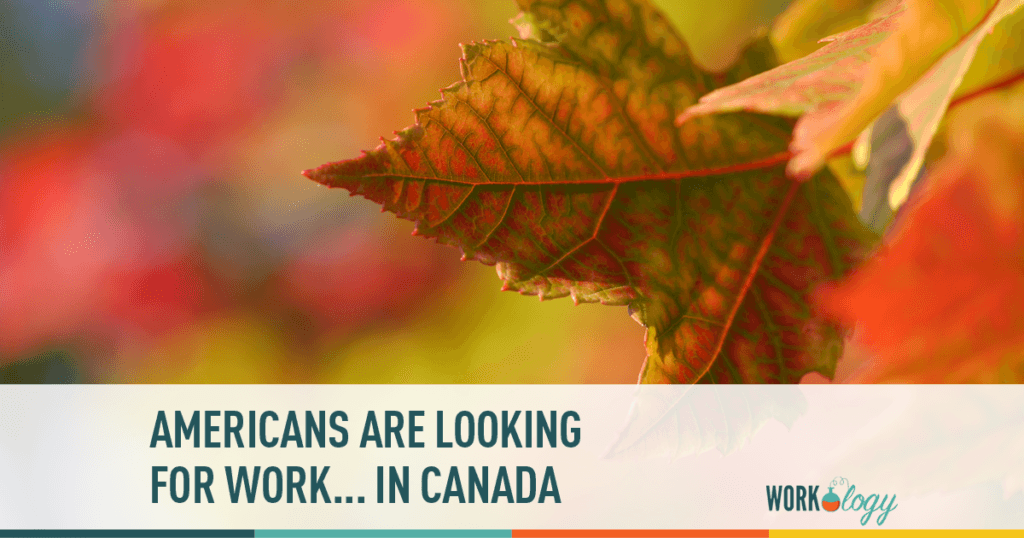When Americans are worried about their country they… fight for what they believe in, sure, but they also talk about moving to Canada. It’s practically an election season tradition. But this year, as the election draws nearer, American job searches in Canada have jumped 58%. Both Monster and LinkedIn have reported a surge in Americans looking for work in Canada.
Canada is close to home, sharing a mostly open border with the US. It has a booming tech sector in Southern Ontario, making it a good bet for engineers, developers and even marketers. It’s culturally distinct, but similar enough to the US that American immigrants rarely have trouble feeling at home. And of course it’s got universal health care, which, depending on your ideological alignment, could be its greatest (or worst) selling point. For all these reasons, Canada has become a traditional escape point for Americans who are dissatisfied with their political process. “Work in Canada” and “Move to Canada” got bumps after the primary and presidential debates — and not just from Democratic voters worried about what a Trump win might mean. During the primaries, Ted Cruz and Marco Rubio supporters looked for jobs in Canada too, after things began looking grim for their candidates.
The Trump Effect Is a Lot Like the Brexit Effect
But although looking for greener pastures in Canada when Americans are stressed is normal, especially during election years, searches this year are particularly high. This isn’t just the idle job searches that followed every Obama v Romney debate; it’s more like the surge in interest in relocation that the UK is seeing post-Brexit.
A majority of British citizens now support the country staying in the EU, but in the meantime, skilled workers have been looking for the exit hatch, searching for work in Europe and further abroad. British job searches in Ireland, for example, jumped 20% after Brexit. And the recent decision of the High Court that Prime Minister Theresa May cannot trigger the actual Brexit process without the approval of Parliament has only made British citizens more confused — and worried. Like Americans worried about the results of Tuesday’s election, British citizens are gripped by ongoing political and economic uncertainty — real problems that stand to impact their careers, finances and daily lives.
In both the UK and the US, those most likely to consider economic emmigration are highly skilled workers in STEM and creative fields. According to Forbes, “Roles in engineering and information technology drew the most [election driven] Monster searches relative to other industries. Queries on LinkedIn followed a similar pattern, with strong interest for software developers and engineers, in addition to project managers and business analysts.” Similarly, British workers with highly transferable skills and income — those with more labour mobility — were more likely to turn their eyes towards work outside of the UK. Low skilled and low paid workers, who in many cases, have the most to lose during times of political and economic instability, also have the lowest labour mobility — unlike STEM and creative workers, they don’t get headhunted with promises of Visas or immigration aid; and unlike high wage workers, they don’t have savings they can put to work on relocating.
How Many Americans Will Really Go to Canada? (Not Many)
For all that American job searches in Canada have jumped, American applications to immigrate to Canada haven’t — yet. Currently only about 9,000 Americans move to Canada each year, primarily for economic, rather than political reasons.
Will that change after the election? I’m inclined to believe that even if Trump wins, we won’t see a flood of immigration from the US to Canada, because leaving home is emotionally and financially difficult and the immigration process, even to a close ally like Canada, isn’t exactly easy. 70% of Canada’s immigrants are economic, with preference given to highly skilled workers; 20% are “family class” (that is, relatives of Canadian residents); and the remaining 10% are refugees. The country’s primary sources of immigration are South Asia, China and the Caribbean; there is no special preference for Americans immigrating to Canada. So as much as you might want to move to Canada if your candidate loses, you might not actually get that chance.
Have you considered a move to Canada? Let’s talk more on Wednesday morning about the likelihood of Americans following through on those job searches — we won’t know how serious they are until after the election.









